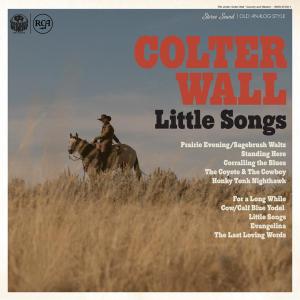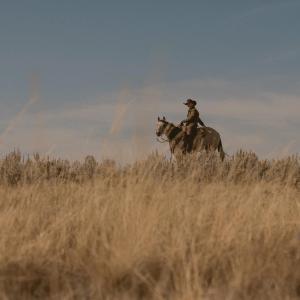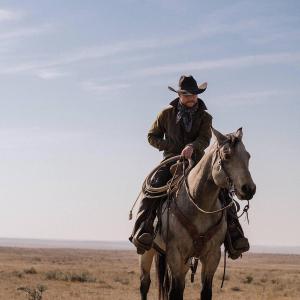
Interview: Scott Ballew Discusses New Album, ‘Rio Bravo’, Creating Short Films for YETI and More
By Maxim Mower




Link copied

Increasingly today, the visual aspect of ‘country’ is becoming just as integral as the audial.
As the multi-faceted genre continues to explode in popularity, so too does the aesthetic associated with country music. Whether it's classic Western and rural, blue-collar brands being deemed uber-fashionable, or the immense success being enjoyed by TV shows such as Yellowstone, the look and feel of country and its implied lifestyle is now just as important as the way it sounds on record.
Yet, with these additional avenues opening up for the genre, there is inevitably further opportunity for commercialisation - something not inherently negative, but a prospect that undoubtedly introduces a danger of superficiality and dilution.
Scott Ballew, alt-country maverick, film-maker and YETI's former Head of Content, has spent the past decade coalescing the cinematic and the sonic landscapes of country.
As well as producing short films for the outdoors brand, he's established himself as an esteemed figure in country music, having just dropped a brand new album, Rio Bravo, his third record and his first with La Honda, home to fellow outlaw, Colter Wall.
Ballew managed to condense the overarching message and tone of YETI into a series of evocative vignettes, in addition to showcasing his gift for visceral, rugged storytelling via Rio Bravo. In all his eclectic pursuits, the Texas multi-hyphenate's unifying strand, interwoven into each body of work he crafts, is clear: authenticity.
Scott Ballew muses, “I think about when I hear someone like Colter Wall or Ryan Bingham, if you're talking about Yellowstone, or Terry Allen and David Berman. You hear something that's raw and kind of sparse, and there's a genuineness to it that cuts through these days when everything is is so easy to over-produce with Pro Tools, Auto-Tune, etc. I think the stuff that resonates on a visceral level is stuff that might not be sonically perfect, but it still feels compelling”.
He expands, “It comes down to honesty and simplicity. I mean, Colter and I sing in totally different ways. But I think I think you can tell when someone's just singing, naturally and honestly, versus a classically trained, perfect singer. There's just so much stuff out there, and the music on the radio can be over-produced. So when you find something surprisingly raw, understated or rough around the edges, it finds its home with those people that are looking for a real experience”.
A key way in which this rawness and sincerity manifests itself in Scott Ballew's music is in his humility and endearingly self-effacing nature. His first two albums were met with widespread acclaim, yet he still carried a niggling doubt into the sessions for Rio Bravo. His collaborators, however, helped him overcome these concerns and embrace the uniqueness of his vocal style and overall sound.
“I've never thought I have a classically good voice”, Scott Ballew confesses, “So when I'm in a room with other musicians that can make it sound really nice, my instinct is to cover it up as much as possible with their goodness. Mike Nau, who produced Rio Bravo, and some of the other musicians were really good at giving me the confidence to let the space provide some of that power. The way we recorded it, it was kind of half-live and spontaneous - half the songs we recorded in one day. Then the other half, it was a bit of a Frankenstein experiment between Mike and I virtually. I'd have a minute to sit with the songs with just the piano or the guitar, and Mike would add one thing at a time, and that approach allowed it to be more stripped down than it probably would have been live”.
It's an approach that helped mould and shape Rio Bravo into the rich, varied project it now is, with Scott Ballew drawing together a melting pot of moods and ambiences to produce what's arguably his most comprehensive, probing and at times haunting record to date. With this being the first fruit of his La Honda Records partnership, it's safe to say listeners will be keenly looking ahead to his next.
In addition, Scott Ballew discussed his work with YETI, the decision to make ‘Rio Bravo’ the title-track and more:
On working with with La Honda Records:
“I'm still pretty hands on, and Travis and Connie at Honda share a similar aesthetic - they're great at just letting the folks do what they're good at. Connie made posters and artwork for 30 years before starting a record label, so she's got a good eye...I feel like we're all in the same fight of using all the tools in our toolkit to help each other get the word out and attack it from various angles”.
On feeling free to experiment:
“I'm not a popular musician, I'm not on the Billboard charts. So there's not this fanbase I'll disappoint by doing one thing or the other. I can still experiment. This has always been my instinct with films, the only way to truly make a film that can move somebody is if you approach it by trying to move yourself, with your own point of view and your own instinct. I approach music in the same way - you have to be the audience. Sometimes that will translate to a wider audience, and sometimes it won't. But if you're trying to chase what you think someone else wants to hear, I don't know if that will ever truly resonate with the greater population”.
On shooting short films for YETI:
“I was there for nine years and this year, I finally decided to move on from YETI. When green-lighting the films, I had to think about it being a specific brand and the target consumers - whether it's an activity, geography or a type of person. I couldn't make films on anything, just because it was a cooler company that was based on the outdoors. So there were certain parameters I had to think about when green-lighting the films that made sense. But once it was green-lit, I could think about it totally freely from my own point-of-view, in conjunction with the subjects and other filmmakers. From the moment of green-lighting, it became about, ‘What's the best story that we tell?’ and ‘How can we arrange this in a way that will make you feel something?’ It doesn't have to do with the product at all, it was just emotional experience”.
On the symbiosis between music and film:
“I don't think I would have gotten into music had I not been making films for 15 years. A lot of that has to do with travelling and the places I see, being in a car watching the West moving outside your window. I think a lot of my stuff started out being landscape-based and visually motivated, just trying paint this picture of where I am, because it's so unique. Then the other component was, I really learned this rhythm of music from being in the room with composers and musicians scoring films. We made 100 short films, and you kind of figure out this way to speak musically, to convey an emotion. That definitely translated over to me when I started writing songs, and I figured out how to piece some things together into a structure that made me feel something when I either saw them or heard them.”.
On the levity he often introduces into his music:
“I think it's natural, based on my sense of humour. It's how I deal with sadness. I've always tried to find a little levity in the demoralising moments of life. It also comes from who I listen to. Terry Allen, John Prine and David Berman - my favourite musicians all had a bit of irony and humour infused into the music. Toeing that line between breaking your heart and making you laugh has always been my objective”.
On writing ‘All That is Sacred’ after recording a documentary of the same name on Key West's ‘70s creative scene:
“I wrote that song while we were filming the documentary. We were in Livingston, Montana, and I was driving down this dirt road to get to [Thomas McGuane's] house for the first interview. I was lost because he gave me the wrong address, and there are these mountain ranges outside Livingston called The Crazies. There's a big fire, and the words started coming to me as I was driving around. I finished them that day...Then we spent another year and a half making the movie. I didn't have a title for the whole two years we were making it. We were editing the film at the same time I was getting final mixes back from Rio Bravo. I was just jogging around listening to those mixes, and that song came on, and I had totally forgot that I wrote it in Tom's driveway in Montana. It seemed like the perfect title for the film. It was such an intimidating process, knowing that I have to present the title to the greatest writers of all time. It just fit. We didn't have a big music budget for the film, so we used a lot of my songs in there”.
On choosing ‘Rio Bravo’ as the title-track:
“It was after all the songs were finished. The song ‘Rio Bravo’ started out about my dad, it was written when he was really sick. It then morphed into being about some friends who were struggling and the inability to help someone who's in a bad place.
Rio Bravo was my dad's favourite movie, and it's just such a strong title. There are a lot of references to water and rivers in the album. I thought the translation ‘Brave River’ being the metaphor of an ego was the perfect title, and tied it all up for the album”.





